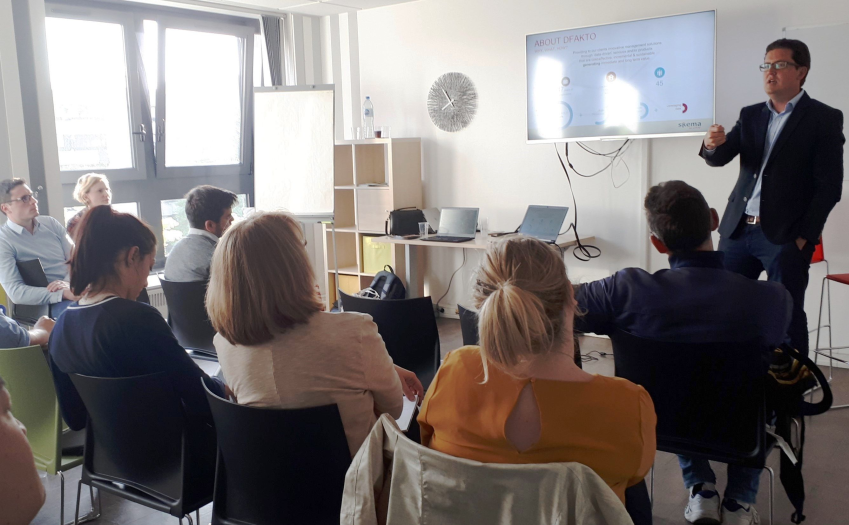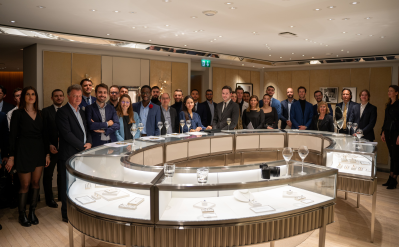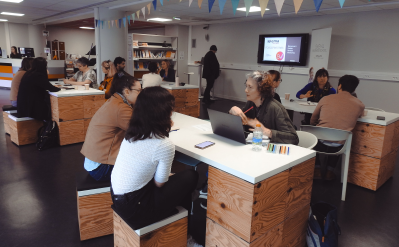News

Our experts talk about change management
The latest Project Management Club meetup was held on 17 May 2018, simultaneously in Lille (photo album) and Paris (photo album): Magali Cauet (SK 2014), Johan Mallet (SK 2009), Marion Bhagwani-Coural (SK 2016) and Anne de Morais share with us their expert perspective on change management. We also thank Bénédicte Dagnac (SK 2006), Deputy Director Marketing and Digital Strategies at Rossel Advertising France, and Cédric Flipo (SK 2003), Associate Consultant at DFakto, for their contributions.
1 – Which of your change management experiences most stands out for you?
Magali Cauet (SK 2014), Project and Change Management Consultant at Mi GSO France.
We were working with Jaguar Land Rover to review their end-to-end processes for car production and we were faced with big pockets of resistance in the plants from the technicians, who could really throw a spanner in the works if they wanted to. We took a punt on those who were the most fiercely opposed to the project and we appointed them ambassadors of their department for the improvement and deployment of the new process. It was a risky gamble, but it paid off. By involving these people from the very early stages and by giving them some responsibility in the project, we turned the most resistant among them (who also happened to be those with the most influence) into true project ambassadors. That is how I realised the importance of “change agents” and how crucial it is to choose them well and to involve them in the project.
Johan Mallet (SK 2009), Freelance Project Manager at MAPP
It was an insurance company. My first surprise was how attached the employees were to the tool they had been using for more than 20 years: it had basic functionalities, lacked flow, there were a lot of repetitions in the tasks to perform, but its users were really fond of it. The challenge was even greater because the new tool was being imposed on everyone following a decision by Corporate. The change went relatively smoothly because the entire company prioritised the project and considerable communication efforts were made to highlight the advantages of the new system.
Anne de Morais, Cultural Transformation Project Director and People & Change Manager at Société Générale
It’s the change management for the CHORUS project, which involved implementing SAP in all French ministries to manage the government’s budget, its orders and accounts. I had a team of 10 consultants who were there to support the Ministry of Finance and its local branches, the General Treasuries across France. The project’s content was extremely rich and taught us a lot: how a government works; how public expenditure and revenues are generated was a situation that resonated with me as a citizen. Where change management was concerned, significant resources were allocated to the project to ensure its success, because any blunders or rejection could have major consequences in terms of public opinion (government contractors paid late, etc.). So I was given the means to roll out an efficient change management plan and without budget cuts, which occur often on other projects.
Marion Bhagwani-Coural (SK 2016), HRIS Consultant at HR Mind (HR Path group)
In 2016, I worked for close to six months for one of the global leaders in consumer goods for DIY and supermarket decoration. My main responsibilities were to advise and assist the group’s different retail chains with their transformation.
The project notably involved the set-up of a shared service centre (payroll), the transformation of HR/managerial roles, and also the rollout of new payroll software.
It was very challenging to be involved in this kind of change management project, made complex by the fact that it was multi-site, nationwide, the people involved were scattered across several retail chains, each with its own identity and different feelings about the project.
2 – In your opinion, what is really needed for successful change management in a context where transformations are happening increasingly fast?
Magali Cauet
We are indeed living in a world where everything is speeding up and the same is true for major changes, which must happen faster to stay ahead of the competition. Good change management is all the more important during rapid transformations to ensure that the benefits expected from the change are long lasting. To me, in such a context it’s crucial to communicate with and support the individuals impacted by the change so that no one feels stressed or left behind. When there is good, transparent communication with the right message, even if the change is happening fast the employees are a lot less anxious because they know where they’re headed.
Johan Mallet
The challenge is to manage change at all levels of the organisation’s hierarchy. Change management has all too often been reduced to a standard PowerPoint presentation with a flyer handout to the operations teams. But for the change to be accepted, the project must be approved and backed by the executive and managerial teams. What’s more, it is essential to communicate about the overall benefits of the change for the organisation. Naturally, end-users tend to reduce the change to the few negative adjustments they will have to make to their own daily work. So communicating about the short- and long-term benefits that this change will bring for the user and their organisation is a must. Ideally, the teams should be guided to find the positive points. That is when they will really get behind the change.
Anne de Morais
To me, what is really needed today is a complete overhaul of change management. For one, because when transformations come one after the other, we rarely have time to manage them one by one. Ideally, if companies make every effort to ensure that employees fully support these transformations, then it is a matter of approaching change management as a substantive activity to develop in employees an “openness” to change, or even a taste for change. We must find ways for employees to no longer be destabilised by change or resistant to it. We should develop the capacity to see change as an opportunity for progress; a win rather than a loss. Next, in a digital environment where people are constantly invited to express themselves freely, to give their opinion, to “evaluate” suppliers (Uber stars, AirBnB reviews, etc.), it feels like there is a growing need to play an active role in one’s environment, to participate, to be involved. Change management must support this shift by using collective intelligence as a lever for getting people on board: have employees participate in the decision and the implementation instead of explaining what top management has planned for them.
Marion Bhagwani-Coural
To me, “successful change management results in a company with a good social climate.”
It also stems from the “meaning” top management gives to the project, or in other words the answer to the “why” behind the company’s transformation (organisational and/or tools). It is therefore crucial to manage to give the end users some meaning and to find the overlap between this “why” and the company’s overarching strategy. This way, it’s easier to get people on board.
3- What is your 2018 challenge when it comes to change management?
Magali Cauet
Over the last fifteen years, project management has been becoming increasingly standardised. The challenge now is to make this field and profession evolve and to integrate change management into it in its own right. It should be considered a key element, because let’s not forget that the goal of any project is not to deliver the project to schedule and budget within the agreed scope, but to achieve the outcomes expected in the business case! And even if you manage to tick off every aspect of the project management triangle when wrapping up your project for a new IT tool, if you don’t have all users on board with you they will continue to use their Excel spreadsheets and you will have lost your time and your money!
Johan Mallet
For several years now, transformations have been speeding up and organisations must adapt to keep up the pace. “The challenge for 2018, and the coming years, is therefore to lighten change management processes – which are sometimes heavy – to make them more agile and adaptable to new contexts.”
Anne de Morais
Continue to explain the usefulness of this discipline and its major contributions to supporting the social transformation we are currently experiencing; and more importantly, really spread collective intelligence practices to all levels of the company: in management, project management, governance, because I think that this is the best lever for developing a taste for change!




